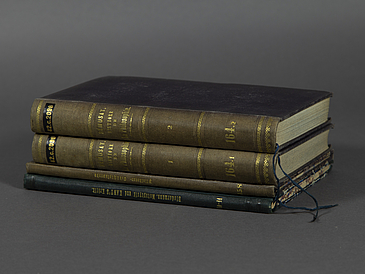University of Bremen: The Bremen State and University Library returns Nazi-looted items
The books contain the bookplate – an artistically designed proof of ownership attached to the inside of the book cover – by Dr. James Klang and are a case of Nazi looted goods: This is what the SuUB project worker Volker Cirsovius discovered while checking access to the library from 1933 to 1948.
After his death, Dr. James Klang (1847-1914) passed his library to his son Dr. Heinrich Klang (1875-1954), who worked as a judge at the Vienna Higher Regional Court from 1925 and was an associate professor. In 1938, after Austria’s “annexation” to Nazi Germany, Dr. Heinrich Klang lost his license to teach at the University of Vienna due to his Jewish origins and was placed in permanent retirement. All attempts to escape from Austria failed. Heinrich Klang was deported to the Theresienstadt ghetto on September 24, 1942. He survived the ghetto and returned to Vienna on July 7, 1945.
According to the accession book, the books found in the SuUB Bremen come from the Viennese “Antiquariats- und Exportbuchhandlung Alfred Wolf”. After his license to teach was revoked, Heinrich Klang had to sell his extensive book collection to the antiquarian bookshop in Vienna, among others. From here, the books went to at least eight institutions that have now formed a consortium for joint return (restitution): the Baden State Library in Karlsruhe, the Bavarian State Library in Munich, the library of the Vienna University of Economics and Business, the Saxon State Library – State and University Library in Dresden, the Bremen State and University Library, the Graz University Library, the Vienna University Library and the Berlin Central and State Library.
“We are pleased that a fair and just solution in accordance with the Washington principles has now been found in a consortium of German and Austrian libraries together with the heirs,” says Maria Elisabeth Müller, director of the SuUB Bremen. The restitution achieved provides that the stolen books will first be handed over to a private person named by the heirs, so that they can later be taken over by the Supreme Court in Vienna (OGH) at the heirs’ request.

